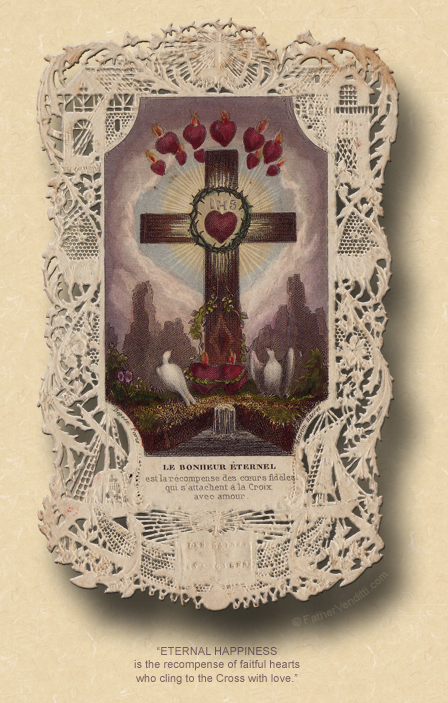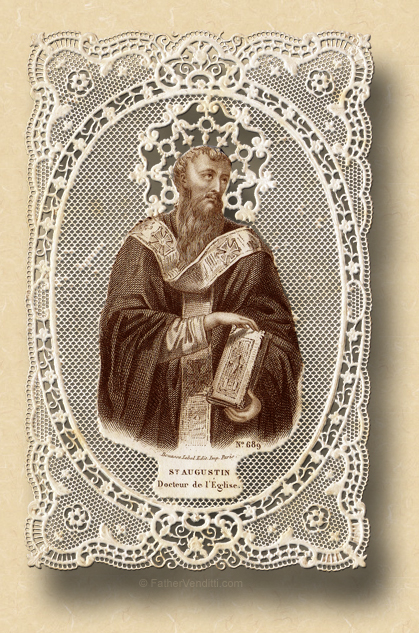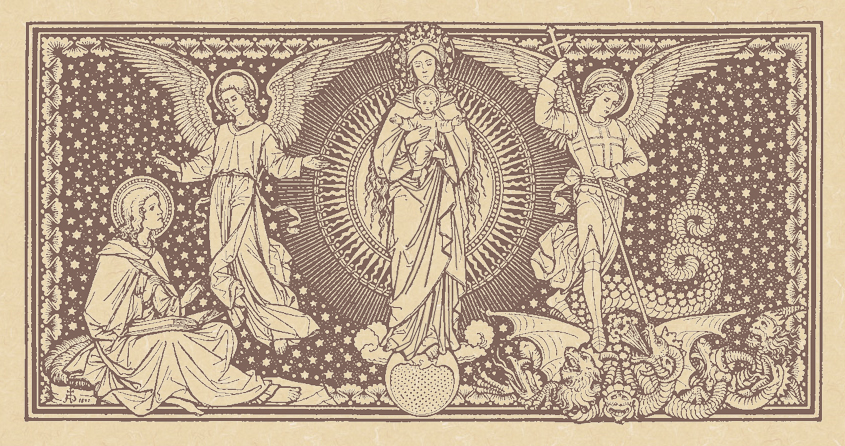Religion Is Not Therapy.
In the United States:
The Thirty-Second Saturday of Ordinary Time; the Memorial of the Dedication of the Basilicas of Saints Peter & Paul, Apostles; the Memorial of Saint Rose Philippine Duchesne, Virgin; or, the Memorial of the Blessed Virgin Mary on Saturday.*
Lessons from the primary feria, according to the ordinary form of the Roman Rite:
• Wisdom 18: 14-16; 19: 6-9.
• Psalm 105: 2-3, 36-37, 42-43.
• Luke 18: 1-4.
|
When a Mass for the memorial of the Dedication is taken, the lessons from the proper are required:
• Acts 28: 11-16, 30-31.
• Psalm 98: 1-6.
• Matthew 14: 22-33.
|
|
When a Mass for the memorial of St. Rose is taken, lessons from the feria as above, or any lessons from the common of Virgins for One Virgin.
|
|
When a Mass for the memorial of the Mother of God is taken, lessons from the feria as above, or any lessons from the common of the Blessed Virgin Mary.
|
|
Outside the United States:
The Thirty-Second Saturday of Ordinary Time; the Memorial of the Dedication of the Basilicas of Saints Peter & Paul, Apostles; or, the Memorial of the Blessed Virgin Mary on Saturday.
Everything as above, excluding anything regarding the memorial of St. Rose.
|
The Third Class Feast of the Dedication of the Basilicas of Saints Peter & Paul.
Lessons from the common "Terríbilis est…" for the Dedication of a Church, according to the extraordinary form of the Roman Rite:
• Apocalypse 21: 2-5.
• [Gradual] Locus iste…**
• Luke 19: 1-10.
The Twenty-Third Saturday after Pentecost (the First of Philip's Fast); and, the Feast of the Holy Martyrs Plato & Roman.***
Lessons from the pentecostarion, according to the Ruthenian recension of the Byzantine Rite:
• II Corinthians 11: 1-6.
• Luke 9: 57-62.
FatherVenditti.com
|
 9:37 AM 11/18/2017 — It’s remarkable how people can have the same collective thoughts without even knowing one another. Everyone I talk to, it seems, is agonizing over the same things—the state of the Church, the seeming sterility of their prayers and the emptiness of their profound solitude in the midst of such uncertainty. We don’t reject the consolation that the Virtue of Faith commands; we just don’t feel it. And everyone I admonish agrees that faith can’t be reduced to an emotional response, everyone agrees when I tell them that God is there and hears our prayers even when we don’t feel His presence, everyone agrees when I quote to them Saint John of the Cross or Saint Teresa of Avila about navigating the Dark Night of the Soul; then, they leave the confessional and return to the morose and depression that comes from the constant confrontation of “what is” verses “what should be.” 9:37 AM 11/18/2017 — It’s remarkable how people can have the same collective thoughts without even knowing one another. Everyone I talk to, it seems, is agonizing over the same things—the state of the Church, the seeming sterility of their prayers and the emptiness of their profound solitude in the midst of such uncertainty. We don’t reject the consolation that the Virtue of Faith commands; we just don’t feel it. And everyone I admonish agrees that faith can’t be reduced to an emotional response, everyone agrees when I tell them that God is there and hears our prayers even when we don’t feel His presence, everyone agrees when I quote to them Saint John of the Cross or Saint Teresa of Avila about navigating the Dark Night of the Soul; then, they leave the confessional and return to the morose and depression that comes from the constant confrontation of “what is” verses “what should be.”
The Gospel lesson of today’s Mass focuses our attention on the power of trusting and persevering in prayer: Saint Luke, in the reporting of a parable told by our Blessed Lord, begins his account with an editorial prologue:—the only one of the Evangelists that does this—“Jesus told his disciples a parable about the necessity for them to pray always without becoming weary” (18: 1 RM3). Why does he do this? The parable itself is pretty straight forward; it’s doesn’t require a secret decoder ring to decipher. The officious judge who cares not a lick for genuine justice grants a just judgment to the poor widow simply because she nags him so incessantly that he gives her what she wants just to get her off his back; the lesson being that, if the judge, who cares nothing for a poor widow, gives her what she wants simply because she’s a pain in the butt, then what about God who loves us beyond measure?
Saint Augustine was one of the first to recognize the “Catch-22” in between the lines of this passage: we pray to God in desperation because our faith is in turmoil, but prayer is fueled by the measure of the faith from which it springs; so, if our faith has been weakened by temptations to despair, then the prayer arising from it is weak and has no effect. The source of all good prayer is faith; but, as Augustine said in the fourth century, “If one’s faith weakens, prayer withers … Faith is the fountain of prayer … A river cannot flow if its source is dried up” (Sermon 115, 10).  In other words, we run to God with desperate prayers, but it’s that very desperation that renders our prayers weak. “…[I]f you have faith the size of a mustard seed,” said our Lord, “you will say to this mountain, ‘Move from here to there,’ and it will move. Nothing will be impossible for you” (Matt. 17: 20 NABRE); the irony being that, if we did have enough faith to move mountains, we probably wouldn’t pray all that much, since most of us only pray when we need something. In other words, we run to God with desperate prayers, but it’s that very desperation that renders our prayers weak. “…[I]f you have faith the size of a mustard seed,” said our Lord, “you will say to this mountain, ‘Move from here to there,’ and it will move. Nothing will be impossible for you” (Matt. 17: 20 NABRE); the irony being that, if we did have enough faith to move mountains, we probably wouldn’t pray all that much, since most of us only pray when we need something.
So, if the efficaciousness of our prayer is determined by the strength of our faith—which is clearly what our Lord is saying—but we are driven mostly to prayer when our faith is faltering, then what do we do? How do we escape this “Catch-22”?
We are suffering—many of us—because we have been brainwashed by this therapeutic mentality in which our society has maneuvered us, thinking that the whole point of prayer—of religion itself—is to bring us peace of mind and heal our emotions, because we have allowed Dr. Phil to become our pope. Faith has nothing to do with emotion, and prayer has nothing to do with feeling better about ourselves. We believe because what we believe is true, and we pray because the God who made us deserves our prayer and worship. How it makes us feel is irrelevant.
And if you doubt that you’ve been poisoned by this therapeutic mentality, look at how most Catholics in this country view the sacraments of of the Church: not as sources of Grace but of rites of passage. For example, a Catholic politician—no one in particular—is told by his bishop that he may no longer receive Holy Communion because of his stand on abortion, so what does he do? He and his family take his grandchildren to an Episcopalian church to be baptized because, for him, baptism isn’t the cleansing of original sin and the restoration of Sanctifying Grace, it’s just a social event for the benefit of family and friends, and has nothing to do with eternal salvation. Marriage isn’t a covenant between two people and their God authorizing them to cooperate in the miracle of creation; it’s just a celebration of love. Confession isn’t the acknowledgment of and absolution from our sins; it’s just a form of free counseling. A funeral isn’t an appeal to God to speed the soul on its journey and keep it safe until the final resurrection; it’s just a form of theatrical grief counseling for the bereaved. And the Holy Sacrifice of the Mass isn’t the Body, Blood, Soul and Divinity of our Lord, God and Savior, Jesus Christ, offered for our sins on the altar of the Cross; it’s just a gathering of togetherness around the table of fellowship. When even the sacraments of the Church become therapeutic rather than salvific, that’s when we know our brainwashing in the vapid spirit of this age is complete, and that’s when we begin to think that prayer has something to do with how we feel.
Let’s go back to the officious judge and the poor widow. The judge is in the wrong job: he doesn’t care about justice, and the widow’s case doesn’t interest him because she’s got nothing that he needs or wants. We are just like him whenever we say, “I pray and pray and pray and don’t get anything out of it.” Who says we’re supposed to get something out of it? Our Lord never told us that. None of the saints ever told us that. The only thing we’re supposed to get out of it—if that’s how you want to put it—is that, when this life is over, we go to heaven. Forgive me for saying this for the “umpteenth” time: our one reason for being on this earth is to work out our salvation; everything else is just window dressing.

* The Basilica of St. Peter on the Vatican Hill, and that of St. Paul "Outside the Walls" on the Ostian Way, were both erected by Constantine on the sites of the martyrdoms of these apostles. They were consecrated by Pope St. Sylvester on this day in the year 325. Both churches were rebuilt: St. Peter's in 1626, consecrated by Pope Urban VIII; and St. Paul's in 1854, consecrated by Blessed Pope Pius IX, who then joined the dedication of the two churches into one solemn celebration.
Born in Grenoble, France, Rose Duchesne founded the first American house of the Religious of the Sacred Heart, opened the first American free school west of the Mississippi, and was known for her courage and desire to serve Native Americans, especially the Potawatomi, who called her "the woman who prayed always." She died at the age of 83 at St. Charles, Missouri.
** The Gradual is non-Scriptural: "This place was made by God, a priceless mystery, it is without reproof. O God, before whom stands the choir of angels, give ear to the prayers of Thy servants."
*** Plato was martyred in Ankara under Emperor Maximianus at the beginning of the fourth century. Roman (or Romanus), a deacon from Cesarea in Palestine, was martyred in Antioch, Syria, in the year 305.
|

